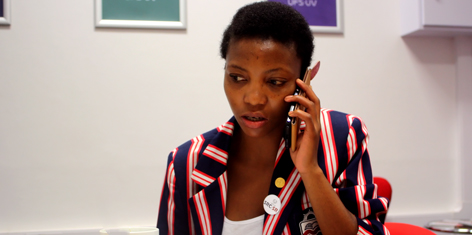Latest News Archive
Please select Category, Year, and then Month to display items
02 January 2025
|
Story Gerda-Marie van Rooyen
|
Photo Supplied
 Leading the research in South Africa is Prof Linus Franke from the Department of Soil, Crop and Climate Sciences.
Leading the research in South Africa is Prof Linus Franke from the Department of Soil, Crop and Climate Sciences.
Scientists are actively pursuing the successful breeding of diploid hybrid potatoes from inbred lines. This is expected to revolutionise potato breeding as it holds the key to rapid genetic progress. It will introduce new varieties for commercialisation through seed. Currently, existing potato variants have a gene that renders self-pollinated seeds infertile.
Prof Linus Franke, an academic in the Department of Soil, Crop and Climate Sciences at the UFS, is leading the research in South Africa. “This technology allows the production of genetically uniform potato seed that is easy to transport and largely disease-free.” He says this differs from conventional breeding whereby only vegetative propagation is possible due to tetraploid varieties in potatoes. It also risks carrying pests and diseases from one generation to the next – leading to the accumulation of pests and diseases with each round of multiplication.
Seed innovation
Prof Franke explains that Solynta BV, a seed company based in the Netherlands that produces potato varieties that can be grown from seed, has included South Africa in their research efforts because it is one of Africa’s largest producers and exporters. Through his academic relationship with Wageningen University and Research, a Dutch institution renowned for its agricultural endeavours and food production, the UFS became involved in researching hybrid potatoes grown from seed.
Diploid seeds containing two sets of chromosomes allow easier gene manipulation to increase predictability and speedier genetic progress. The breeding approach enables the incorporation of tolerance to pests, diseases, abiotic stresses (cold, heat, drought) and other desired genetic traits.
Although Prof Franke is optimistic about this research, he is not blind to disadvantages. “Potato seeds are tiny and have little energy reserves, making it harder to grow potatoes from seed than from tubers.” He says potatoes from seed will take longer to cultivate than tubers, as farmers need to grow plantlets from seeds first, adding six weeks to the growing period. “It is possible that commercial farmers can grow potatoes directly from seed. Alternatively, perhaps more likely, specialised growers will produce tubers of potatoes from seed; these tubers are then sold as seed tubers to other potato farmers, who then continue their normal practices of producing potatoes for the market from tubers.”
Financial benefits
Prof Franke says farmers have reason to get excited. “Seed potatoes will reduce input costs, as varieties with enhanced tolerance to pests and diseases require less pesticides. Planting one hectare of potatoes requires three to four tonnes of potato tubers, but only one 25 g packet of potato seeds.” Since potatoes are a more valuable commodity than maize, this technology might also increase farmers’ income potential.
SRC interim member takes giant leaps – in high heels
2014-02-24

Photo: Jerry Mokoroane
Passion. Commitment. Drive. Enthusiasm. All these characteristics are embedded in Masabata Mokgesi, SRC interim member: Postgraduate Council of our Bloemfontein Campus. This lady has taken giant strides in both leadership and academic roles, establishing herself as a force to be reckoned with.
Mokgesi has completed her BA Honours degree with distinction. She is currently enrolled for a master’s in Media Translation, with the intent of attaining her PhD before tackling the work domain. Her excellent academic performance led to her being awarded the UFS Golden Key Scholarship Chapter Award last year.
Mokgesi is a master when it comes to time management, since she has to pay attention to several responsibilities simultaneously. As a leader, a research administration intern at the National Research Foundation and lecturer at the university, she has her hands full.
“I have always believed in myself and that there is still more one can achieve, hence, I never got comfortable in the lot I have achieved thus far,” says Mokgesi.
But wait, there is more! This remarkable young lady is also into fashion and modelling, having won Miss Mangaung Municipality and Miss ConLaur?s titles. “There is a perception that academics are in most cases dressed inappropriately, and I surely want to break that stigma. We can always look after our well-being,” she added with some laughter.